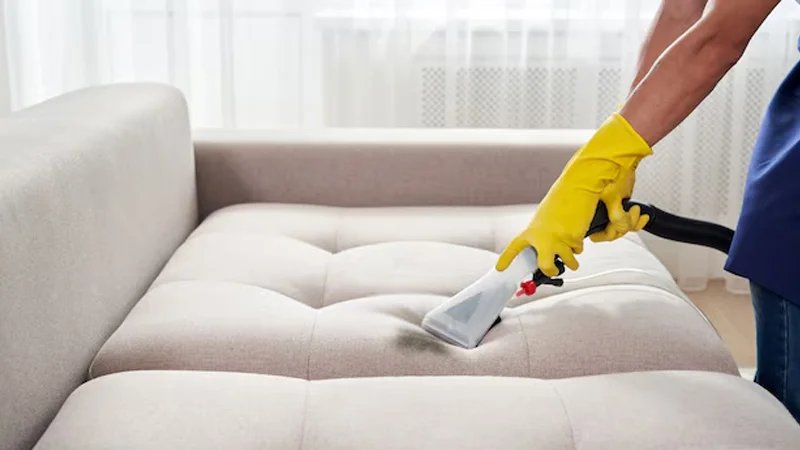In today’s health-conscious society, creating an allergen-free environment is increasingly important, especially for families. One commonly overlooked source of allergens in the home is the sofa. Sofas, being frequently used and often in close proximity to where we relax and spend significant time, accumulate various allergens such as dust mites, pet dander, pollen, and mold spores. Over time, these allergens can significantly impact indoor air quality, triggering allergies or exacerbating asthma symptoms.
This article delves into how deep cleaning your sofa can mitigate these health risks, offering a more thorough approach to maintaining a healthier living space. Additionally, we will explore practical, professional cleaning techniques that can aid in reducing allergens in your home.
Understanding the Common Allergens Found in Sofas
The Allergens Lurking in Your Sofa
Sofas are known to harbor a variety of allergens, some of which may be invisible to the naked eye but can still provoke an allergic response. Common culprits include:
- House dust mites: These microscopic creatures are the primary source of allergic reactions in many households. They thrive in warm, moist environments, often nesting in the deep layers of fabric. They feed on dead skin cells, which are abundant in household settings, making sofas an ideal breeding ground.
- Pet shedding particles: If you have pets, their fur and dander can easily settle into the upholstery of your sofa. Even small amounts of pet dander can trigger allergic reactions, especially in sensitive individuals.
- Airborne pollen: During pollen season, this allergen can be easily carried into your home through open windows or on clothing. Sofas, particularly those positioned near windows, can trap significant amounts of pollen, contributing to allergic responses.
- Fungal growth: Sofas located in areas with high humidity levels are prone to mold and mildew development. These fungi can release spores into the air, exacerbating respiratory issues and triggering allergies.
The Health Implications of Unaddressed Allergens
For individuals with allergies or respiratory conditions, prolonged exposure to these allergens can lead to a range of symptoms, including:
- Sneezing
- Nasal congestion
- Itchy or watery eyes
- Persistent coughing or wheezing
- Asthma flare-ups
In severe cases, continuous exposure can even lead to chronic respiratory conditions. Therefore, minimizing allergens in your home by maintaining clean and sanitized furniture is essential for safeguarding the well-being of your family.
The Advantages of Deep Cleaning Your Sofa
Effectively Eliminating Allergens
Regular cleaning alone may not suffice to completely rid your sofa of hidden allergens. Deep cleaning, however, offers a more comprehensive solution. While vacuuming helps remove surface dirt and debris, it often fails to reach the deeper layers of upholstery where dust mites, pet dander, and other allergens accumulate. A professional deep cleaning approach can target these areas, ensuring the removal of even the most stubborn allergens.
- Steam Cleaning: One of the most effective methods for deep cleaning sofas is steam cleaning. The high temperature of steam is capable of eliminating dust mites, bacteria, and fungi. Steam cleaning penetrates deep into the fabric, sanitizing it and neutralizing harmful allergens.
Enhancing Indoor Air Quality
Deep cleaning your sofa not only improves its appearance but also contributes to better indoor air quality. Sofas act as a sponge for allergens, and over time, these particles can be released into the air as you sit or move on the furniture. By removing these accumulated allergens, you reduce the chances of them circulating in the air, thereby promoting a healthier breathing environment.
Prolonging the Lifespan of Your Sofa
In addition to its health benefits, deep cleaning can also help maintain the aesthetic appeal and longevity of your sofa. Over time, accumulated dirt and grime can degrade the fabric, leading to premature wear and tear. Regular deep cleaning helps preserve the integrity of your upholstery, extending the life of your furniture and ensuring that it remains comfortable and attractive.
Techniques for Deep Cleaning Your Sofa to Prevent Allergies
Routine Vacuuming for Allergen Control
The first and simplest step in managing allergens in your sofa is regular vacuuming. It is essential to use a vacuum cleaner equipped with a HEPA (High-Efficiency Particulate Air) filter to effectively trap dust, pet dander, and other fine particles. Be thorough in vacuuming the seams, crevices, and under the cushions, where allergens are likely to accumulate.
- Frequency: Vacuum your sofa at least once a week to prevent the buildup of allergens.
Steam Cleaning: A Thorough Approach
For a deeper clean, steam cleaning provides a highly effective solution. Steam’s high temperature can eradicate dust mites and other microorganisms that regular cleaning methods often miss. Additionally, steam cleaning can help remove stains, odors, and discoloration, leaving your sofa refreshed and sanitized.
- How to Steam Clean: Begin by vacuuming the sofa thoroughly to remove surface debris. Then, use a steam cleaner with an upholstery attachment to treat the fabric. Ensure that you do not saturate the upholstery with excess moisture, as this could encourage mold growth.
Washing Removable Covers
Many sofas come with removable cushion covers or slipcovers, which can be washed separately. Washing these covers regularly at high temperatures helps eliminate allergens such as pet dander, pollen, and dust mites. Always follow the manufacturer’s instructions to ensure proper care, and air-dry the covers to avoid shrinkage.
Using Anti-Allergen Sprays
After deep cleaning, consider applying an anti-allergen spray designed to neutralize allergens like dust mites and pet dander. These sprays form a protective barrier on the fabric, making it more difficult for allergens to accumulate. Be sure to choose a product that is safe for the material of your sofa.
Professional Upholstery Cleaning Services
For particularly challenging cleaning tasks or delicate fabrics, professional upholstery cleaners can provide the expertise and specialized equipment needed for a thorough deep clean. Professionals often use techniques such as hot water extraction or dry cleaning, which can remove stubborn allergens without damaging the fabric.
Preventing Future Allergens from Accumulating in Your Sofa
Allergen-Resistant Sofa Covers
Consider investing in allergen-resistant sofa covers. These specially designed covers are made to create an effective barrier against dust mites, pet dander, and other allergens, making it easier to maintain a cleaner sofa. They are washable, which allows for regular cleaning without exposing the upholstery to harmful chemicals.
Pet Grooming and Hygiene
If you have pets, their dander can contribute significantly to allergens on your sofa. Regular grooming, including frequent baths and brushing, can help reduce the amount of dander your pets shed. Additionally, restrict your pets from sitting on the sofa or cover the seating area with a washable blanket to protect the upholstery from allergens.
Maintaining Ideal Humidity Levels
Dust mites and mold thrive in humid environments. By maintaining a relative humidity of 30-50%, you can reduce the likelihood of these allergens flourishing. Using a dehumidifier in areas with high humidity, such as basements or rooms without good ventilation, can help maintain optimal moisture levels in the air.
Deep cleaning your sofa is an essential part of maintaining a healthy home environment, particularly if your family members are prone to allergies. By employing techniques such as regular vacuuming, steam cleaning, and using anti-allergen sprays, you can significantly reduce the allergens lurking in your upholstery. These methods not only help alleviate allergy symptoms but also contribute to improved indoor air quality and prolonged furniture longevity.
Incorporating a comprehensive cleaning routine for your sofa is a proactive step toward safeguarding your family’s health. Whether you tackle the task yourself or enlist professional services, regular deep cleaning will help create a cleaner, more allergen-free living space, making your home a healthier place to live.
By adopting these practices, you’ll not only enjoy a cleaner sofa but also a healthier and more comfortable home.








